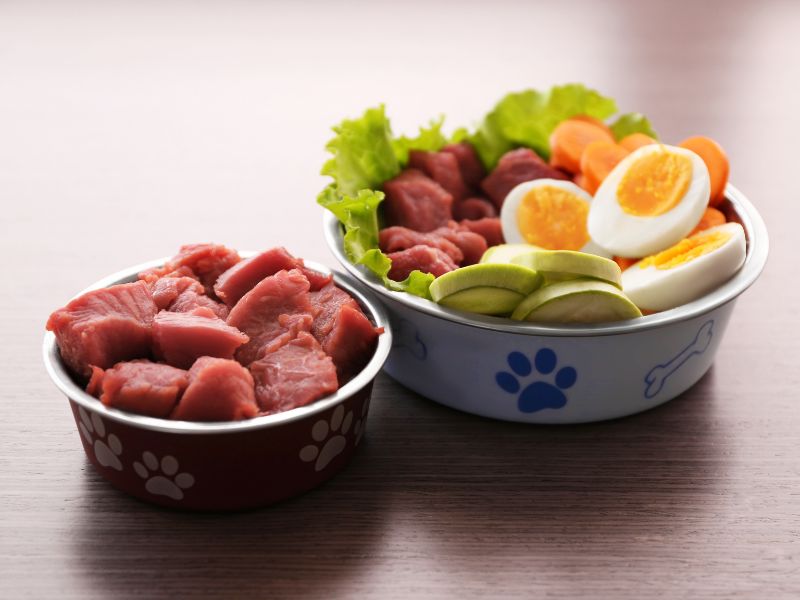You know that dog gut health is important–in fact, science says that the gut is intricately connected to your dog’s brain function. So it makes sense that you want to know the best ingredients for dog gut health. The good news is that when you strengthen gut health in your best friend, you’re strengthening overall health and immunity as well. Even better, you can do it in a way that your dog finds absolutely delicious!
Why doesn’t dog gut health rely on a dog’s diet?
While a healthy diet plays an important role in ensuring a dog’s gut health is the est it can be, it is not the sole factor that determines the overall well-being of the dog’s digestive system. There are several reasons why a dog’s gut health cannot rely on diet alone. A diet lacking in essential nutrients, high in processed ingredients, or containing low-quality ingredients can negatively impact dog gut health. Insufficient fiber, excessive carbohydrates, and an imbalance of beneficial bacteria can disrupt the delicate balance of the gut microbiome and lead to digestive issues.
- Gut Microbiome: A dog’s gut is home to a complex ecosystem of microorganisms known as the gut microbiome. These bacteria and other microbes play a huge part in a dog’s digestion, and this impacts nutrient absorption, immune function, and the overall health of your dog’s gut. While diet influences the makeup of your dog’s gut flora, there are other factors that decide the health of the gut. This does include your pet’s diet, but also things like genetics, environmental exposure and even stress can play into your dog’s digestive health. Your dog’s gut health depends on much more than your dog’s food. While certain dog foods can help add good bacteria, if your dog’s digestive tract isn’t able to digest and absorb appropriately, you may be spending money that’s not making a big difference.
- Stress and Anxiety: Dogs can experience stress and anxiety like we do, which can adversely affect the dog’s gut. Stress can disrupt the balance of beneficial bacteria in the gut (probiotics), prevent optimal digestion, and lead to the dog’s gastrointestinal tract having problems like diarrhea and constipation to name a couple of the top problems. When your dog’s routine changes, or they deal with loud noises or separation anxiety, this can cause stress for them. That’s when you may see conditions like stress colitis or vomiting. Making sure their mental health is a priority with good exercise and mental stimulation as well as focusing on your pet’s gut health can promote better overall health and a healthier immune system.
- Exercise and Physical Activity: Regular exercise and physical activity are essential for maintaining optimal gut health in dogs. Exercise helps stimulate your dog’s digestive tract to keep what you feed it moving through at the appropriate speed to have maximum nutrient absorption. This leads to their optimal health and immune health, and can also help keep them at a healthy weight too.
- Hydration: Proper hydration is critical for healthy digestion and a dog’s gut health being its best. . Water intake helps maintain proper moisture levels in the digestive system, which also helps food move through your dog’s digestive tract at the right speed to prevent constipation and diarrhea.
What compromises dog gut health?
The digestive tract, also known as the gut, has a collection of hundreds of different types of microbes and bacteria that are responsible for obtaining and digesting nutrients. The goal is to have a balance of good bacteria (probiotics) to harmful bacteria. Your dog’s gut microbiome needs that balance or harmful bacteria will flourish get out of control. This can lead to serious issues like leaky gut syndrome, inflammatory bowel disease, and other digestive conditions.
In addition to the issues we mentioned above, there are several things that can compromise the balance of your dog’s gut bacteria. They include some of the following:
- Antibiotics and Medications: Antibiotics, while sometimes necessary to treat bacterial infections, can also disturb your dog’s healthy gut microbiome by killing harmful and beneficial bacteria. Other medications, such as nonsteroidal anti-inflammatory drugs (NSAIDs) or corticosteroids, can also adversely affect good gut health.
- Food Allergies or Sensitivities: Certain dogs may develop allergies or sensitivities to specific ingredients in their diet, such as grains, dairy, or proteins. These allergic reactions can trigger inflammation in the gut, leading to digestive problems and compromising gut health. Often, these sensitivities and intolerances are signs of a problem with your dog’s gut lining and you should seek ways to improve your dog’s gut health.
- Parasites and Infections: Intestinal parasites such as worms or infections caused by bacteria, viruses, or protozoa can disrupt the normal functioning of the gastrointestinal tract and compromise your dog’s gut. These conditions can lead to inflammation, diarrhea, and nutrient malabsorption.
- Environmental Factors: Exposure to environmental toxins, pollutants, and chemicals can harm gut health. Pesticides, herbicides, and other harmful substances can disrupt the balance of the gut microbiome and leave beneficial gut bacteria lacking.
- Sudden Dietary Changes: Abrupt changes in a dog’s diet, especially without a proper transition period, can disrupt the balance of the gut microbiome and cause gastrointestinal issues.
- Breed Predispositions: Certain dog breeds may be more susceptible to specific gastrointestinal conditions or have a higher risk of gut health issues due to genetic predispositions. Dog owners of these breeds should seek out ways to support their dog’s immune system and gut health.
Common signs your dog has digestive problems
If your dog has any of the following, you will want to improve your dog’s gut health. These signs show there could be a problem in your dog’s stomach, and your dog’s health overall can be affected based on these symptoms:
- Changes in stool quality
- Increase or decrease in pooping
- Fever
- Lethargy
- Weight loss
- Abdominal pain
- Vomiting
- Regurgitation
- General changes in appetite
What are the best ingredients for dog gut health to be its best?
If you’re looking to support your dog’s gut health, there are several natural ingredients you can use. They include:
- Miscanthus Grass: Miscanthus grass is an eco-friendly fibrous plant material that can help promote healthy dog digestion. It acts as a source of premium dietary fiber, supporting regular bowel movements, improving nutrient absorption, and fueling beneficial gut bacteria. It’s a great ingredient to help overweight dogs as well, as it not only enriches your dog’s digestive tract, but helps them to feel fuller longer and not take in more calories than they can burn.
- Prebiotics: Prebiotics are non-digestible fibers that serve as food for beneficial bacteria in the gut. Ingredients such as inulin and xylooligosaccharides (XOS) are common prebiotics found in dog food. They help stimulate the growth of beneficial gut bacteria, enhancing gut health and promoting balanced digestion.
- Probiotics: Probiotics are live beneficial bacteria that, when ingested, can support a healthy gut microbiome. Bacillus subtilis and Bacillus coagulans are two specific strains of probiotics that offer unique benefits for dog gut health compared to other probiotic strains. They have spore-forming ability, which means they can form protective spores that help them survive the harsh conditions of your dog’s stomach. This means more of the good bacteria reach the intestines and colonize. They also are two strains that have better stability and shelf life. They’re more stable and resistant to environmental factors like heat, humidity, and manufacturing. This stability allows them to maintain their potency throughout production, storage, and consumption, ensuring that sufficient viable bacteria reach the gut. Once the spores of Bacillus subtilis and Bacillus coagulans reach the intestines, they can germinate and become active, viable bacteria. Their ability to survive the acidic conditions of the stomach and the presence of bile salts in the intestines means they have better chances of establishing a beneficial presence in the gut.
- Digestive Enzymes: When a dog eats, digestive enzymes aid in the breakdown of food and enhance nutrient absorption. Ingredients like protease, amylase, and lipase are commonly used to improve your dog’s digestion. They can help dogs with enzyme deficiencies or those with sensitive stomachs by assisting in the breakdown of proteins, carbohydrates, and fats.
- Omega-3 Fatty Acids: Omega-3 fatty acids, such as those found in flax seed or fish oil, have anti-inflammatory properties that can help reduce gut inflammation and support overall digestive health. They also improve your dog’s gut by helping feed the beneficial bacteria in their microbiome.
- Pumpkin: Pumpkin is rich in dietary fiber as well as water content. The fiber in pumpkin adds bulk to the stool, helping to prevent and alleviate constipation and diarrhea in dogs. It also promotes healthy gut motility, allowing food to move through the digestive tract smoothly. Pumpkin also contains natural digestive enzymes, which aid in the breakdown of carbohydrates.
Why is Bernie’s Perfect Poop the best way to improve your dog’s gut?
Your dog’s diet is the first place to start when you want to improve your dog’s gut health, but the next thing you should turn to is Bernie’s Perfect Poop. Perfect Poop has essential ingredients for the best dog gut health, and it comes in two delicious formulas dogs love. We created Perfect Poop to help give our own furry family members the best gut health they could have, and to help them have longer, happier, healthier lives. We know that good health starts from the inside out, and the ingredients in Perfect Poop were combined for not just the perfect poop, but the perfect dog gut too!


